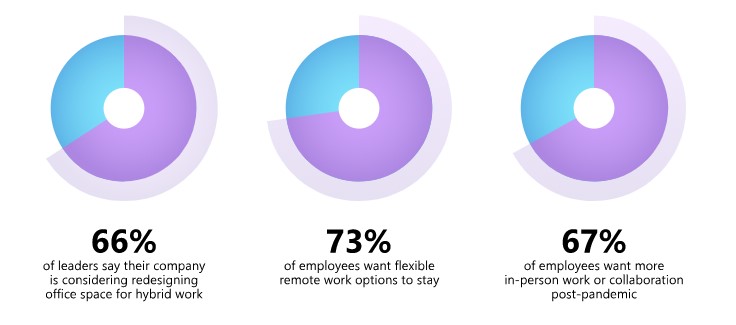Top Jobs in Canada for a Post-Pandemic Career Change
June 9, 2021
|
The pandemic has had a profound effect on the economy, how we interact which has, in turn, affected the Canadian job market, causing many to rethink their current occupations. Many people have had to adapt their outlook on future employment as new demands are on the rise in various industries.
Canada has already recovered 93,300 jobs in July 2020.
This article will delve into some of the top jobs in Canada in 2021 which are causing employees to make a move from their current employment job sector.
Top Canadian Job Opportunities to Change Your Career

According to weforum.org, the job landscape will have shifted quite dramatically by 2025. Most jobs that will see an increase in demand are those in AI, data, product development, and cloud computing. The following tech occupations will continue to grow in demand.
- Data Analysts and Scientists
- AI and Machine Learning Specialists
- Big Data Specialists
- Digital Marketing and Strategy Specialists
- Process Automation Specialists
- Business Development Professionals
- Digital Transformation Specialists
- Information Security Analysts
- Software and Applications Developers
- Internet of Things Specialists.
Almost 70 percent of product development, data, and AI sectors are being filled by employees from related/different sectors. The reason why this is possible is that even though these employees lack certain data science skills, they can easily be trained in 76 days of training.
Post pandemic jobs show an increase in new technologies as well as a demand for new products and services. With new products and services comes more opportunities in jobs to market these products through sales and content production, which will also require self-development and self-management skills.
Top skills to have for post-pandemic tech jobs in Canada
- Python Programming
- Algorithms
- Writing
- Strategy
- Artificial Neural Networks
- Regression
- Grammar
- Deep Learning
- General Statistics
- Problem Solving
Source: Coursera (World Economic Forum's New Metrics CoLab)

Top 20 trending jobs during the pandemic
According to Randstad, the top in-demand skills to have in 2021:
- Customer Service - in sectors such as telecoms, healthcare, finance, travel and tourism, and hospitality etc.
- Scheduling - new health and safety protocols, reduced teams means better planning is crucial, planning is essential to ensure employee wellness
- eCommerce - customers shift to online purchases due to COVID-19, especially in retails spaces like clothing, automotive, consumer electronics, food and beverage, health, personal care and beauty, and entertainment.
- Budgeting - decrease in revenue, companies will need guidance and forecasting as well as innovative solutions to generate cash flow
- Repair - maintain infrastructure services and functions including industries like Energy and utilities, Information and Communication Technologies, Finance, Health, Food, Water, Transportation, Safety, Government, and Manufacturing.
- Project Management - with remote work trending, project management is a must in almost every sector
- Cleaning and Sanitizing - as COVID-19 regulations require strict health and safety protocols, more sanitizing and cleaning businesses, as well as staff, will be required
- Quality Control - especially in Pharmaceutical, medical, aerospace, construction, and manufacturing sectors
- Administrative Support - with remote work and flexible hours trending, administrative roles are increasing is a must in almost every sector especially HR, health and social policy development, education, finance, healthcare, communications, advertising, and marketing.
- Accounting - big and small companies require good accountants to assist with financial models, negotiate flexible supplier and vendor payment terms, and so on.
Highlight on the construction sector
Canada's construction sector has been booming for years now, employing about 1.2 million people or about seven percent of the workforce in Canada. The number of construction jobs in Canada has nearly doubled due to a need for infrastructure and housing and was able to get back on track by adapting to COVID health and safety measures.
Although the sector took a hard knock because of COVID, it is expected to bounce back this year, with major projects such as Bellechasse Transport Centre in Montreal, Calgary’s Complex Continuing Care Facility, and the new Brampton Transit Facility on the horizon.
It is expected that 100,000 new jobs will be created in Canada’s construction sector, offering many opportunities to skilled foreign workers.
Highlight on the manufacturing sector
Canada's manufacturing sector is another industry that is expected to grow over the next few years. There is currently a need for engineers who are able to retool and support manufacturers during the pandemic. Essentials such as food and medical supplies always need to be transported which means Canada will always need experienced truck drivers.
Highlight on the energy sector
Canada’s energy sector is one of the country’s most stable throughout the pandemic. In jUn 2020 alone, 13,000 jobs in Canada were added back to the market. The oil and gas sector employs about 950,000 Canadians and although experiencing a small dip of 6.6 percent it is estimated that by 2041 there will be a shift in job prospects, with one in three oil and gas jobs could be fully automated.
Financially secure jobs in Canada during COVID-19
The following jobs reported little to no change in remuneration during the pandemic.
Financially Secure Jobs During the Pandemic
- Nurse
- Teacher
- Corporate Employee
- Veterinarian
- Nonprofit professional
- Physician Assistant
- Lawyer
- Physician
- Government employee
- Pharmacist
Why So Many People Are Choosing New Career Paths

As many jobs in Canada, and globally, become redundant due to COVID-19 restrictions on travel many people have found themselves having to look outside of their chosen industry to find employment. According to Prudential Financial’s Pulse Of The American Worker Survey, one in four people are prepared to look for new job openings once the effects of the pandemic have subsided.
A global survey done by Microsoft’s Work Trend Index revealed that of over 30,000 people in 31 countries who responded, 41 percent are considering leaving their place of employment in 2021, which, a figure which has nearly doubled according to LinkedIn Senior Editor, George Anders. 42 percent of those working remotely said that if they weren’t offered the opportunity to continue to work remotely they would look for other opportunities. 80 percent of those looking for new jobs said that they were concerned about career growth, with 72 percent rethinking their skillset.

SOURCE: Microsoft Work Trend
Many employers are relooking making the shift to remote work permanent as many people start looking for hybrid work options. Below are some of the main things employees are looking for in new work opportunities:
- Flexible remote work - 70 percent
- 65 percent who want in-person time
- Greater employee/employer engagement
- Overworked - 39 percent feel exhausted and 54 percent feel overworked.
- Work-life balance - 1 in 5 employees feels their employer doesn’t care about work-life balance, 30 percent said they’d reduce their pay for a better work-life balance
- Growth - many people feel that their career has plateaued due to the pandemic (80 percent of those considering finding a new job)
- Better company culture
How to Move to Canada in a Post Pandemic World

Moving anywhere during the pandemic is an unnerving prospect, but the truth is that half of the year is already gone, most people wanting to immigrate to Canada will only be able to do so in the new year. On average most immigration programs have a processing time of six to eight months. There are some exceptions, such as the British Columbia Provincial Nominee Program (BCPNP), which has average processing times of two to three months.
For this reason, it's a good idea to start your Canadian visa application process so that you can start 2022 off on a fresh start in a country filled with employment prospects and unbelievable opportunities.
The applications process generally takes 3 main steps:
1. Assess your eligibility
It doesn’t help to apply for various programs if you aren’t sure which ones you qualify for. With more than 100 options available, it may be a good idea, at the very least to have your eligibility assessed by a professional.
2. Select Your Immigration/Visa Program & Apply
Once you know which programs you qualify for you can confidently move forward with starting the application process. Once presented with your most favourable option you will be able to make an informed decision not only about which program is most likely to give you your desired outcome but is best suited to your specific needs.
3. Gather Your documents
Once your visa application forms have been filled in and submitted you will be requested some additional information. It’s a good idea to start gathering these documents before you are asked for them as you will be given strict submission deadlines to adhere to. The added bonus of using a representative is that will receive a complete checklist of everything you’ll need.
How Do I Start My Canadian Journey?
The choice is essentially up to you. You can choose to apply for your visa on your own by using the free government resources or use the services of an experienced, licensed, and credible immigration professional like MDC Canada. We do all the heavy lifting so that you can focus on your next career development opportunity in Canada.
